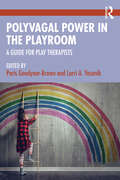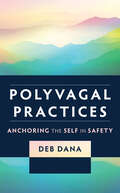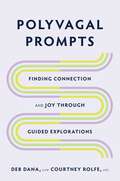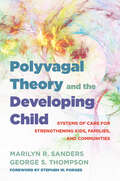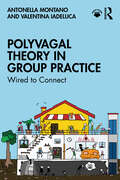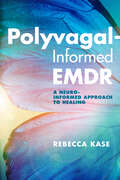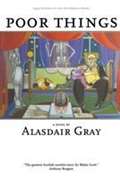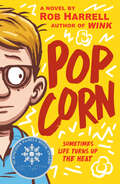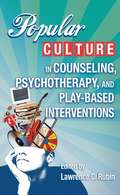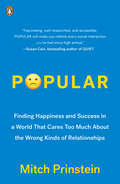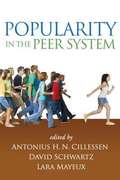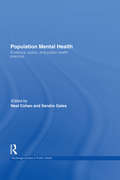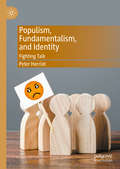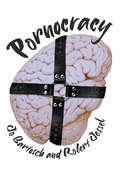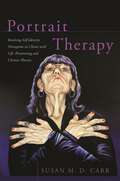- Table View
- List View
Polypharmacy in Psychiatry Practice, Volume II
by Michael S RitsnerAlthough monotherapy is generally recommended as the treatment of choice, treatment resistance of patients with psychosis, cognitive, mood and anxiety disorders represents a significant clinical problem. In this context, augmentation and combination strategies are commonly employed to address this problem. Although multiple medication use common in psychiatric practice, reasons, efficacy and safety for polypharmacy, and augmentative strategies have remained unclear. It remains unclear if there is an evidence base to support polypharmacy. Furthermore, excessive and inappropriate use of psychotropic medications has been recognized as a public health problem. This volume is the first comprehensive, clinically oriented, reference on the multiple medication use to treat psychotic, cognitive, mood and anxiety disorders.
Polyvagal Flip Chart: Understanding the Science of Safety (Norton Series on Interpersonal Neurobiology #0)
by Deb DanaOffers therapists a low tech–high impact, interactive way to explain polyvagal theory to clients. When clients are stuck in the cognitive experience of their story, an explanation of polyvagal theory helps to bring their attention to the autonomic experience— to bring the importance of the biology of their experience back into awareness. Yet polyvagal theory can be challenging and intimidating to explain. This flip chart offers therapists an easy, standardized way to support clients in understanding the role of the autonomic nervous system in their lives. Using a flip chart makes psycho- education an interactive experience. Therapists can feel confident in teaching their clients polyvagal theory by following the chart. With a flip chart visible during sessions, the therapist can: remind clients of the ways the autonomic nervous system has been shaped and is active in their daily living experience, display a page corresponding to the present moment, thus anchoring that experience in the theory, keep a page of the hierarchy visible when working with a client's habitual response pattern.
Polyvagal Perspectives: Interventions, Practices, and Strategies (Norton Series on Interpersonal Neurobiology #0)
by Stephen W. PorgesFrom the originator of Polyvagal Theory, new writings on applying a polyvagal perspective across disciplines. Polyvagal Theory has revolutionized our understanding of the autonomic nervous system’s profound impact on various aspects of life, including sociality, emotional regulation, cognitive functions, and overall mental and physical well-being. Through rigorous academic testing, the theory’s applications have expanded into diverse fields such as psychotherapy, medicine, education, and performance. Exploring these broad applications revealed that Polyvagal Theory transcends its initial scope, and that the principles embedded in the theory could be applied as a generalized lens across various disciplines. In this volume, Dr. Stephen W. Porges—the originator of Polyvagal Theory—presents a collection of recent writings that showcase the wide-ranging applications of the polyvagal perspective. The writings update the theory and delve into sociality, safety and threat, trauma, functional medicine, vagal nerve stimulation, Ehlers-Danlos syndrome, addiction, compassion, management, and dance movement therapy. This newest volume of Dr. Porges’s work demonstrates how adopting a polyvagal perspective enriches our understanding of biobehavioral processes in diverse domains.
Polyvagal Power in the Playroom: A Guide for Play Therapists
by Paris Goodyear-Brown Lorri A. YasenikPolyvagal Power in the Playroom shows therapists how to treat children using play therapy to address the hierarchy of autonomic states. What do children need and how do play therapists purposefully use the principles of play to increase the feeling states of safety and regulation? Step inside the playroom and discover how trained play therapists are addressing treatment using polyvagal theory when working with children and teens.The book is organized into three parts: Interruptions explores developmental derailments brought about by relational betrayals such as domestic violence, child sexual abuse, and attachment ruptures implicated in a myriad of adverse childhood experiences. In these cases, the neuroception of safety scaffolded through "good enough" rhythms of healthy caregiver/child interactions is either compromised through a thousand relational cuts (parental addiction or parental mental illness) or abruptly ended (divorce, death or incarceration of a parent) Happenings explores events that involve an external intrusion, such as natural disasters, wars, and pandemics Expressions of risk and resilience explores mental health symptom clusters such as depression, anxiety, dissociation, and explosive behavior through the lens of dorsal vagal or sympathetic nervous system states, as well as specific play therapy methods for healing the nervous system The therapeutic powers of play are illustrated through case examples and in practical, play-based interventions woven throughout the book.Child and play therapists will come away from Polyvagal Power in the Playroom with the tools they need to help children and their caregivers achieve deeper levels of safety and connection.
Polyvagal Practices: 50 Client-centered Practices (Norton Series On Interpersonal Neurobiology Ser. #0)
by Deb DanaBringing the benefits of polyvagal theory to readers through easy-to-implement exercises. Here, for the first time, is a layperson’s explanation of polyvagal theory, an approach to mental health and well-being that has taken the clinical world by storm. A polyvagal approach to life is based on the knowledge that the autonomic nervous system is shaped by early experience and reshaped with ongoing experience. This short book offers an overview for nonspecialist readers and provides a series of exercises and meditations (practices) that allow readers to tune into their nervous systems, providing calming prompts to build and strengthen ventral vagal connections. This book includes a never-before-published comprehensive chapter on polyvagal theory, preceded by exercises that focus on mapping, reflecting, listening, deepening, creating, and connecting. Readers who want to change a pattern and find new rhythm for their nervous systems can use this material to work toward those goals.
Polyvagal Prompts: Finding Connection and Joy through Guided Explorations
by Deb Dana Courtney RolfeDiscover the remarkable ways your nervous system works in service of your safety and well-being. Polyvagal Theory, developed by researcher and scientist Dr. Stephen Porges and popularized by therapist Deb Dana, has impacted countless lives. It has changed the way therapists work with their clients and provided a pathway toward healing for those who have experienced hardship or trauma. In Polyvagal Prompts, Deb Dana and Courtney Rolfe invite readers to explore their nervous systems through Polyvagal Theory with engaging questions and exercises, which readers can respond to directly in the pages of the book. Readers are guided in noticing their systems, listening with curiosity, and reflecting on what they learn. The prompts can be used as a daily practice or to explore specific topics at the reader’s own pace, and are also ideal for helping clients track and reflect upon their polyvagal-informed therapies. No matter how readers decide to explore, Polyvagal Prompts offers an invaluable opportunity to begin the life-changing journey of befriending one’s nervous system.
Polyvagal Safety: 50 Client-centered Practices (IPNB #0)
by Stephen W. PorgesThe foundational role of safety in our lives. Ever since publication of The Polyvagal Theory in 2011, demand for information about this innovative perspective has been constant. Here Stephen W. Porges brings together his most important writings since the publication of that seminal work. At its heart, polyvagal theory is about safety. It provides an understanding that feeling safe is dependent on autonomic states, and that our cognitive evaluations of risk in the environment, including identifying potentially dangerous relationships, play a secondary role to our visceral reactions to people and places. Our reaction to the continuing global pandemic supports one of the central concepts of polyvagal theory: that a desire to connect safely with others is our biological imperative. Indeed, life may be seen as an inherent quest for safety. These ideas, and more, are outlined in chapters on therapeutic presence, group psychotherapy, yoga and music therapy, autism, trauma, date rape, medical trauma, and COVID-19.
Polyvagal Theory and the Developing Child: Systems Of Care For Strengthening Kids, Families, And Communities (IPNB #0)
by Marilyn R. Sanders George S. ThompsonHow sustained disruptions to children’s safety have physical, behavioral, and mental health impact that follow them into adulthood. At its heart, polyvagal theory describes how the brain’s unconscious sense of safety or danger impacts our emotions and behaviors. In this powerful book, pediatrician and neonatologist Marilyn R. Sanders and child psychiatrist George S. Thompson offer readers both a meditation on caregiving and a call to action for physicians, educators, and mental health providers. When children don’t have safe relationships, or emotional, medical, or physical traumas punctuate their lives, their ability to love, trust, and thrive is damaged. Children who have multiple relationship disruptions may have physical, behavioral, or mental health concerns that follow them into adulthood. By attending to the lessons of polyvagal theory—that adult caregivers must be aware of children’s unconscious processing of sensory information—the authors show how professionals can play a critical role in establishing a sense of safety even in the face of dangerous, and sometimes incomprehensibly scary, situations.
Polyvagal Theory in Group Practice: Wired to Connect
by Antonella Montano Valentina IadelucaThis book describes Wired to Connect, a 10-week program for groups based on Polyvagal Theory that is structured, easy to teach, and suitable for everyone. The course is designed to help people develop an awareness of how their autonomic nervous system affects them as they navigate the joys and challenges of life, and how to embrace and modulate its reactions to lead a more serene and fulfilling existence.It begins with an introduction to the theory and functioning of the autonomic nervous system, whose biological response to threats – real or perceived – can determine whether a person lives in a state of open connectedness or mobilized/immobilized protectiveness. It continues by reviewing the knowledge and skills required to lead the program, along with an overview of its structure and the various teaching modules that, like building blocks, form each class.The second part of the book serves as a manual for leading the course. Going session by session, activity by activity, it offers specific, hands-on scripts to help convey the theory to course participants in a simple and engaging way, along with experiential exercises on breath, movement, and sounds, as well as homework assignments and guided immersions into mindfulness. Valuable teaching aids – such as color plates, audio tracks, and slides – are available for download to assist the instructor in guiding their students through the Wired to Connect journey.Not only can psychologists and psychotherapists lead the program, but also other compassionate professionals, such as teachers, doctors, nurses, and community workers. Polyvagal Theory in Group Practice is a clear, concise, and comprehensive handbook for anyone interested in learning how to benefit from a polyvagal lifestyle and to share this knowledge with others.
Polyvagal-Informed EMDR: A Neuro-Informed Approach to Healing
by Rebecca KaseLinking two cutting-edge approaches to form a robust healing model. Polyvagal Theory and EMDR are two well-respected theoretical and practical models with immense implications for therapeutic practice. Polyvagal-Informed EMDR outlines a comprehensive approach for integrating Polyvagal Theory into EMDR Therapy. Individually, each model offers powerful pathways to healing. Combined, these models supercharge therapy and the recovery process. The integration of Polyvagal Theory within the eight phases of EMDR Therapy offers the psychotherapist a robust, dynamic, neuro-informed framework for case conceptualization, treatment planning, and client transformation. The approach applies not only to work with trauma and PTSD, but also in the treatment of addictions, anxiety, depression, grief, chronic pain, and adjustment disorders. EMDR therapists will find a method that maintains fidelity to the evidence-based practice of EMDR and aligns with current neuroscience research. Topics covered include the nervous system and toxic stress, neuroception, adaptive memory networks and autonomic resiliency, neuro-informed history taking, and the importance of therapeutic presence. Clinical interventions, scripts, and handouts are included for all eight phases of EMDR, as well as case examples and opportunities for experiential practice. This is the first book to treat these topics together: assessing complex material and presenting it in an approachable, engaging manner.
Polyvagal Exercises for Safety and Connection: 50 Client-centered Practices (Norton Series on Interpersonal Neurobiology #0)
by Deb A. Dana Deb DanaA practical guide to working with the principles of polyvagal theory beyond the therapy session. Deb Dana is the foremost translator of polyvagal theory into clinical practice. Here, in her third book on this groundbreaking theory, she provides therapists with a grab bag of polyvagal-informed exercises for their clients, to use both within and between sessions. These exercises offer readily understandable explanations of the ways the autonomic nervous system directs daily living. They use the principles of polyvagal theory to guide clients to safely connect to their autonomic responses and navigate daily experiences in new ways. The exercises are designed to be introduced over time in a variety of clinical sessions with accompanying exercises appropriate for use by clients between sessions to enhance the therapeutic change process. Essential reading for any therapist who wants to take their polyvagal knowledge to the next level and is looking for easy ways to deliver polyvagal solutions with their clients.
Poor Eaters: Helping Children Who Refuse To Eat
by Joel Macht Edward Goldson Sharon Felber TaylorAn accessible overview of anxiety, anxiety disorders, and the effectiveness of various behavioral and drug treatments. .
Poor Things (British Literature)
by Alasdair GrayThe lives of two doctors become hopelessly entangled with a woman who was created by one of them, in a freewheeling novel set in nineteenth-century Glasgow and the Mediterranean.
Popcorn
by Rob HarrellWinner of The Schneider Family Book Award The beloved author of Wink is back with a hilarious and moving story about coping with anxiety on a day when everything is going wrongAndrew&’s just trying to make it through Picture Day, which is easier said than done when it seems like the whole world is out to get him—from a bully to a science experiment gone wrong to a someone else&’s juice snot (don&’t ask).But as Andrew goes through the school day, and as one thing after another goes wrong, that little kernel of worry in his stomach is getting hotter and hotter, until it threatens to pop and turn into a public panic attack, his worst fear. He tries to keep his anxiety at bay, but the news that his grandmother with Alzheimer&’s is missing is too much.Interspersed with humorous spot art and &“anxiety file&” panels that depict the real, difficult feelings of anxiety and OCD and real tips for coping, this is a poignant, personal, and laugh-out-loud funny story about letting go of control and accepting help—all while trying to get the perfect school picture.
Popper, Otto Selz, and the Rise of Evolutionary Epistemology
by Michel Ter HarkThis book demonstrates that Karl Popper's philosophy of science, with its emphasis on the method of trial and error, is largely based on the psychology of Otto Selz. Selz's theory of problem solving and scientific discovery laid the foundation for much of contemporary cognitive psychology. This original analysis covers Popper's early writings before he began his career as a philosopher.
Popular Culture in Counseling, Pschotherpay,and Play-Based Interventions
by Lawrence C. RubinPopular culture, simply stated, is the language of a people, expressed through everything from its clothing, food choices, and religious practices to its media. The popular and predominant values, interests, and needs of a society find their way into mass consciousness through a variety of venues including literature, cinema, television, video games, sport, and music. Through the inter-related forces of mass production, global marketing and the Internet, the fruits of popular culture penetrate into stores, living rooms, and everyday experience of children, teens, and adults in the form of catchphrases, toys, iconography, celebrities, and indelible images. Psychotherapists and counselors who can tap into the powerful images, messages, and icons of popular culture have at their disposal an unlimited universe of resources for growth, change, and healing. Using real-world case examples and sound psychological theory, this book demonstrates how you can immediately start incorporating popular culture icons and images into your counseling or therapy. In this way, the authors will help elevate your ability to conduct clinical interviews with clients of all ages and all types of clinical problems.
Popular: Finding Happiness and Success in a World That Cares Too Much About the Wrong Kinds of Relationships
by Mitch PrinsteinA leading psychologist examines how our popularity affects our success, our relationships, and our happiness—and why we don’t always want to be the most popularNo matter how old you are, there’s a good chance that the word “popular” immediately transports you back to your teenage years. Most of us can easily recall the adolescent social cliques, the high school pecking order, and which of our peers stood out as the most or the least popular teens we knew. Even as adults we all still remember exactly where we stood in the high school social hierarchy, and the powerful emotions associated with our status persist decades later. This may be for good reason. Popular examines why popularity plays such a key role in our development and, ultimately, how it still influences our happiness and success today. In many ways—some even beyond our conscious awareness—those old dynamics of our youth continue to play out in every business meeting, every social gathering, in our personal relationships, and even how we raise our children. Our popularity even affects our DNA, our health, and our mortality in fascinating ways we never previously realized. More than childhood intelligence, family background, or prior psychological issues, research indicates that it’s how popular we were in our early years that predicts how successful and how happy we grow up to be. But it’s not always the conventionally popular people who fare the best, for the simple reason that there is more than one type of popularity—and many of us still long for the wrong one. As children, we strive to be likable, which can offer real benefits not only on the playground but throughout our lives. In adolescence, though, a new form of popularity emerges, and we suddenly begin to care about status, power, influence, and notoriety—research indicates that this type of popularity hurts us more than we realize. Realistically, we can’t ignore our natural human social impulses to be included and well-regarded by others, but we can learn how to manage those impulses in beneficial and gratifying ways. Popular relies on the latest research in psychology and neuroscience to help us make the wisest choices for ourselves and for our children, so we may all pursue more meaningful, satisfying, and rewarding relationships.
Popularity in the Peer System
by David Schwartz Antonius CillessenBringing together leading researchers, this is the first volume to comprehensively examine popularity among children and adolescents what it is, how it is attained, and its impact on peer interaction and individual development. The book clarifies how popularity is distinct from being socially accepted or well liked and how it is different for girls and boys. Behaviors that characterize popular peers are explored, as are the developmental benefits and risks of popularity and its connections to peer influence processes. Innovative measurement approaches and research designs are clearly described.
Popularizing Science: The Complex Terminological Interactions between Scientific and Press Discourses within the Field of Agroecology
by Hélène LedoubleMedia coverage of scientific issues is a highly complex process. It involves making a specialized field accessible to the general public, without necessarily disseminating the associated scientific terms or knowledge. The terminological interactions between press discourses and scientific knowledge are presented within the field of agroecology. The analysis of textual data focuses on articles in the general press in French and English, devoted to plant protection practices using natural mechanisms (biological control). This book provides a terminological and cognitive overview of the issues involved in popularizing science in a rapidly expanding field, and of the challenges to be met in the constantly evolving environmental communication sector.
Population Mental Health: Evidence, Policy, and Public Health Practice
by Sandro Galea Neal CohenFirst Published in 2012. Routledge is an imprint of Taylor & Francis, an informa company.
Populism, Fundamentalism, and Identity: Fighting Talk
by Peter HerriotWhat can populism and fundamentalism possibly have in common? Peter Herriot argues that contrary to their apparent differences, these human phenomena are similar in two basic respects. First, they are both reactions against the complexities of the modern world in general, and its current crisis in particular. They propose instead a return to a mythical golden age, supposedly marked by purity and simplicity. Second, they both work in the same way psychologically. Using social identity theory, Herriot shows how both populism and fundamentalism create constant conflict by contrasting a virtuous ‘Us’ with a stereotypically evil ‘Them’. Contemporary case studies illustrate this process at work, and Herriot raises various issues as a basis for discussion, and concludes with hope.
Pornocracy
by Jo Bartosch Robert JesselThey say everybody uses porn. They’re wrong. People don’t use pornography: it uses us. And you don’t have to watch it to be one of its victims.In this thought-provoking and timely book, Jo Bartosch and Robert Jessel expose how the multi-billion-dollar pornography industry has humanity gripped in a chokehold. From rewiring our brains and normalising sexual violence, to shaping new protest movements, the pornographic revolution has achieved a stunning and near-total victory.The triumph of the pornocrats is made more sinister by society’s widespread acceptance that ‘all men watch porn’, the denial of its devastating harms, and a lack of political will to curb the power of the global pornography business.The authors answer the questions that politicians and policymakers are too scared to ask. Why, despite over half a century of feminist gains and lessons in schools on ‘consent’, do today’s school children display more sexist attitudes than their parents and grandparents? Do women really want to be choked and humiliated in bed? How can we fight back and reclaim sex, love and relationships?Drawing on the latest research, Pornocracy charts how the neurological shifts caused by porn use reverberate through society. The book also warns of a dystopian future where AI-powered porn and sextech threaten to reduce us all to masturbating meat puppets on an algorithmic production line.Provocative and powerful, Pornocracy tells the story of how pornography fundamentally changed—perhaps forever—what it is to be human.
Pornography and Sexual Deviance: A Report of the Legal and Behavioral Institute, Beverly Hills, California
by Michael J. Goldstein Harold S. Kant John J. HartmanDoes pornography represent "a clear and present danger' to our society? This issue is being debated in the courts with increasing frequency, and is intimately tied to the broader issue of censorship and the voiding of first amendment protection which it implies. This volume deals both with the psychological effects of exposure to erotica and with the legal implications of censorship of pornography. This title is part of UC Press's Voices Revived program, which commemorates University of California Press's mission to seek out and cultivate the brightest minds and give them voice, reach, and impact. Drawing on a backlist dating to 1893, Voices Revived makes high-quality, peer-reviewed scholarship accessible once again using print-on-demand technology. This title was originally published in 1973.
Pornography of Meat
by Carol J. AdamsHow does someone become a piece of meat?Carol J. Adams answers this question in this provocative book by finding hidden meanings in the culture around us. From advertisements to T-shirts, from billboards to menus, from matchbook covers to comics, images of women and animals are merged - with devastating consequences. <p><p> Like her groundbreaking The Sexual Politics of Meat, which has been published in two editions, The Pornography of Meat uncovers startling connections: Why pornography demonstrates such a fascination with slaughtering and hunting, Fixations on women's body parts expressed through ads for the breasts, legs, and thighs of chickens and turkeys, Animals to be eaten as meat presented in seductive poses and sexy clothing, Back-entry poses in pornography, implying that women - especially women of color - are like animals: insatiable, How meat advertising draws on X-rated images, Why at least one prominent animal-rights group is actually "in bed" with pornographers. <p><p> With 200 illustrations, this courageous and explosive book establishes why Adams's slide show, upon which The Pornography of Meat is based, is so popular on campuses across North America and is reviled by the groups she takes on with insight and passion. From the rise of chain steakhouses to the language of the hunt, from the halls of government to the practice of artificial insemination on farm animals, The Pornography of Meat shows exactly how harm to others parades as fun.
Portrait Therapy: Resolving Self-Identity Disruption in Clients with Life-Threatening and Chronic Illnesses
by Susan CarrPortrait therapy reverses the traditional roles in art therapy, utilising Edith Kramer's concept of the art therapist's 'third hand' to collaboratively design and paint their clients' portraits. It addresses 'disrupted' self-identity, which is common in serious illness and characterised by statements like 'I don't know who I am anymore' and 'I'm not the person I used to be'. This book explores the theory and practice of portrait therapy, including Kenneth Wright's theory of 'mirroring and attunement'. Case studies, accompanied by colour portraits, collages and prose-poems, provide insight into the intervention and the author highlights the potential for portrait therapy to be used with other client groups in the future.



